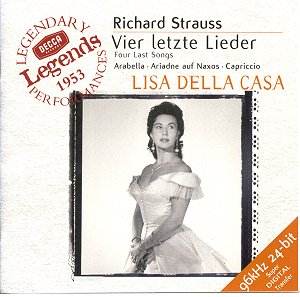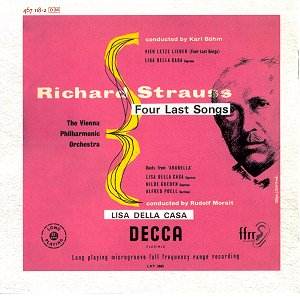Richard STRAUSS (1864-1949)
Four Last Songs
Excerpts from: Arabella, Ariadne auf Naxos and Capriccio
 Lisa Della
Casa, Vienna Philharmonic Karl Böhm
Lisa Della
Casa, Vienna Philharmonic Karl Böhm
 DECCA
Legends 467 118-2
[66:36]
DECCA
Legends 467 118-2
[66:36]
Crotchet
AmazonUS

Sonics appraisal by David Dyer
I approached this disc with considerable trepidation.
Why? Because this version of the Four Last Songs was a discovery from over
forty years ago, during that wonderful period from the mid-teens to the
mid-twenties when life truly was full of wonder. When for me, music previously
unknown, once encountered, had the impact that enabled repeated listening
to be a positive joy with the pleasure increasing upon each hearing.
Those days, alas, are long gone, and many of those early treasures have since
become, if not tarnished, less lustrous than the initial impression had conveyed.
Thankfully, some still remain undiminished, the Four Last Songs among them.
However, I have come to recognise that with the passage of time, unlike many
music lovers who have that gift of hearing only the music regardless of any
extraneous accompaniments, I am not so blessed.
LPs for me became a frustration rather than a pleasure as I found myself
almost dreading quiet passages with the inevitable intrusion of spits and
pops. Even live performances could be destroyed by the fidgety rustling of
a programme, or a lethally interjected cough. I am therefore an unashamed
digital man for whom the advent of CD, despite its attendant ills, particularly
in the early days, allowed pleasure to be derived from recorded music once
more.
Hence my trepidation. Was a golden memory from forty years ago to be revealed
as yet another of youth's delusions. Happily the answer is no.
This reissue is, of course, in unadorned mono, but Decca have in my opinion,
effected a remarkable resurrection, and Della Casa's voice in particular
shines through revealing beyond question the very special quality which created
so powerful an impression so long ago. Of course the recording sounds dated;
how could it not, but the overall experience is, I believe, likely to be
quite acceptable even to younger ears uninfluenced by the tolerance of nostalgia.
Compared with more recent versions, Gundula Janowitz in analog sound and
Felicity Lott in Chandos's digital, limitations are clearly revealed, but
while the Della Casa may not be the only version which one would want to
have on one's shelf, it would now merit regular airings, even for one who
is perhaps unduly concerned by sound quality.
The Capriccio excerpt is similarly successful. Well done Decca.
David Dyer
Equipment used: Proceed CD transport. Chord
DSC 1100 DAC. SPA3200 Pre-amp. SPM 1200B Power amp. B&W Nautilus 802
Speakers.
Ian Lace's original review is repeated below
Lisa della Casa born near Bern in 1919. In her heyday she sang with the most
radiant tone and beautiful musicianly phrasing. Initially, she concentrated
on lyric soprano roles (Gilda, Pamina, Sophie). Then, gradually, she extended
her repertoire to include spinto roles but she was always careful never to
strain the voice. Although it was extremely powerful (as evinced in her high
notes in the Arabella excerpts on this album). The two composers who best
suited her voice and temperament were Mozart and Richard Strauss.
In the Four Last Songs recorded here della Casa is accompanied by that celebrated
Strauss interpreter, Karl Böhm. This must be considered an authentic
reading because the four songs are performed in the order that Richard Strauss
preferred - i.e. 'Beim Schlafengehen' (Time to Sleep); 'September';
'Frühling' (Spring); and 'Im Abendrot'
Furthermore, and it will come as a surprise to some, Böhm eschews the
broad tempi and quite arbitrary ritardandos that became the fashion, that
instilled the work with exaggerated solemnity and pathos because it was thought
that that was the appropriate manner for a great 'swan song'. Instead, Lisa
della Casa imbues these glorious songs with a fresh youthful charm devoid
of cloying sentimentality. Here the mood is conciliatory, bright and
spiritualised. Böhm accompanies her gloriously; that sublime violin
solo in 'Beim Schlafengehen' has rarely sounded so haunting and those pp
horn figures that close each movement are beautifully refined and distanced
perfectly. The sinuous lines of 'September', with the voice floating angelically
above, are also contoured and shaded to perfection.
The excerpts from Arabella are heart-warming too. The role gives della Casa
the opportunity to display a range of emotions. First we hear the aria leading
to the duet with her sister Zdenka (ravishingly sung by Hilde Gueden) in
which Arabella sings wistfully 'he's not the right man for me' but that if
there is a right man for her there will be no doubt about it. Della Casa
and Gueden are quite exquisite. Exquisite too is the haunting and passionate
climax of the following duet for Arabella and Mandryka (an oaken Paul Schoeffler)
when they acknowledge their love. The third excerpt is the closing scene
in which, after some tribulation Mandryka (this time a slightly lighter voiced,
Alfred Poell) and Arabella's relationship is cemented. Another enchanting
moment this, with Strauss at his most sensuously romantic.
When Lisa della Casa appeared as Ariadne in 1949 some critics expressed
reservation about such a young singer daring to take on a role that could
be as demanding as any in the Wagnerian soprano repertoire. But she adapted
to the role and freed the character of the heroics that had generally burdened
it. As can be heard here she sings 'Es gibt ein Reich' (And it has a name:
the realm of death), like some young innocent girl surrendering herself with
an untroubled spirituality to the dark god Hermes. It is interesting to hear
the lowest register of the voice early on as she utters the dread name of
the god.
The concluding excerpt is from Richard Strauss's last opera Capriccio. Della
Casa shows off her distinguished aristocratic voice as the Countess who is
wooed by a poet and a composer. She sings the composition that is their joint
collaboration. She must choose between words or music. She finally decides
that both words are equally important - but as for the men; well that is
left open as she coquettishly swishes her fan at her reflection in her mirror.
For every Richard Strauss fan this CD is an absolute must
Ian Lace



